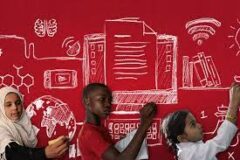Key stakeholders across Africa from various ministries, civil society organizations and the United Nations reiterated strong commitment to advancing Sustainable Development Goal 4 objectives during post-Transforming Education Summit (TES) consultations on 27 February at the margins of the ninth Africa Regional Forum for Sustainable Development taking place in Niamey, Niger. This thematic session was hosted by the Government of Niger, and co-organized by UNESCO, UNICEF and Development Coordination Office Regional Office for Africa (DCO Africa).
Developing a common understanding of the outcomes of the Transforming Education Summit (TES) and building on its momentum to accelerate progress on the transforming education agenda at the country level were the objectives of the events. Speakers and panellists, through their interventions, issued a call to action for decision-makers and national and international organizations to invest more in education as it is one of the keys to unlocking the broader breakthroughs that our world urgently needs to secure a better future for all.
After a compelling opening speech by the Prime Minister of Niger, H.E. Ouhoumoudou Mahamadou, who provided the audience with an overview of the different ways in which Niger is supporting and transforming education, the Minister of Education of Niger, Ibrahim Natatou, urged counterparts to remain politically active around the transforming education agenda.
“The problem of education is known. The diagnosis has been done. the challenges have been brought out. Now we need to apply therapy. And that therapy needs cooperation from almost everyone. By working together with the united nations we overcome challenges. We must allow the new generations to be hopeful and bring forward hope”. H.E Ibrahim Natatou, Miniter of Educatio in Niger.
Triple-headed crisis in education
In Africa, 70% of the total population is under the age of 30. While this presents huge opportunities for the continent’s growth, these can only materialize if young people are fully empowered and given the right opportunities to fulfil their full potential. With the continuous increase of school-age children and the fact that we live in a rapidly changing world, in which conventional education systems are struggling to deliver the knowledge, skills and values needed to create a greener, better and safer future for all, challenges arise not only with regards to accommodating all learners but also in providing quality education to all. Additionally, the pandemic has exacerbated deep and long-standing challenges, leaving progress towards Sustainable Development Goal 4 badly off track. During the peak of the pandemic, an estimated 297 million students in Africa were affected by school closures, resulting in severe learning losses across the continent.
All these developments exacerbated a triple-headed crisis in education, as mentioned by Leonardo Garnier, Special Adviser of the Secretary-General on the Transforming Education Summit, during the session. We are now dealing with a crisis of equity and inclusion, a crisis of quality and a crisis of relevance, affecting millions of learners across the world.
Dimitri Sanga, UNESCO’s Director for the Multisectoral Regional Office for West Africa, echoed the Special Advisor and stated that these crises have not spared Africa. He continued by saying: “the one thing it brought us was that it called upon all of us to reflect deeply on the relevance and resilience of our education system.”
“The pandemic made us rethink what we expect from education and urged us to imagine how we can change it. Dimitri Sanga”, UNESCO Directos for Multisectoral Regional Office for west Africa.
Transforming Education Summit
The Transforming Education Summit, a key initiative of Our Common Agenda, was convened in September 2022, to elevate education to the top of the global political agenda. The Summit helped mobilize national and international commitments to reignite efforts to advance education-related goals of the Agenda 2030 for Sustainable Development and reimagine education systems to be fit for the future. At the Summit, the Heads of State of Africa issued a Declaration for a continental vision with a set of priorities for transforming education in Africa. UNESCO’s Reimagining our futures together: A new social contract for education report serves as the reference document for transforming education. It seeks to help Member States and other stakeholders recover from COVID’s educational disruptions, revitalize national and global efforts to achieve Sustainable Development Goal 4 and reimagine education systems for the world of today and tomorrow.
Best practices and lessons learned
Several high-level speakers took the floor in Niamey and shared insights, experiences and good practices. UNESCO’s Assistant Director-General for Education Stefania Giannini emphasized the need to focus on developing and implementing strong action plans for following up on transforming education commitments. She urged all stakeholders to keep alive the momentum created by the Summit and strategically build on it by amplifying its messages. Finally, she mentioned the flagship initiatives convened at the Summit; multi-partner initiatives aimed to mobilize cross-country cooperation. These initiatives, on greening education, digital learning, foundational learning, education in crisis situations and gender seek to leverage greater financial, technical and political support for country-level implementation.
Stefano Savi, UNICEF Director in Niger stressed that education is a universal human right and the best tool to fight poverty. He emphasized, however, that in order to elevate education in Africa, support from other sectors is needed. We need multisectoral partnerships to address education challenges and opportunities in Africa.
“Transforming Education in Africa is everybody’s business” Stefano Savi, UNICEF representative in Niger.
In line with this, Eskedar Nega, Deputy Director of DCO Africa reminded the audience of a crucial prerequisite for success on the transforming education agenda by highlighting that in order to land the transformation at the country level, we need to ensure a whole-of-government approach and a whole-of-society approach. In line with that, United Nations Resident Coordinator in Sierre Leone, M. Babatunde Ahonsi emphasized that; “education is a common goal and a public endeavour”. The consultations reminded everyone of their role in the transforming education process, to contribute to an accessible, future proof and safe education system for all.

